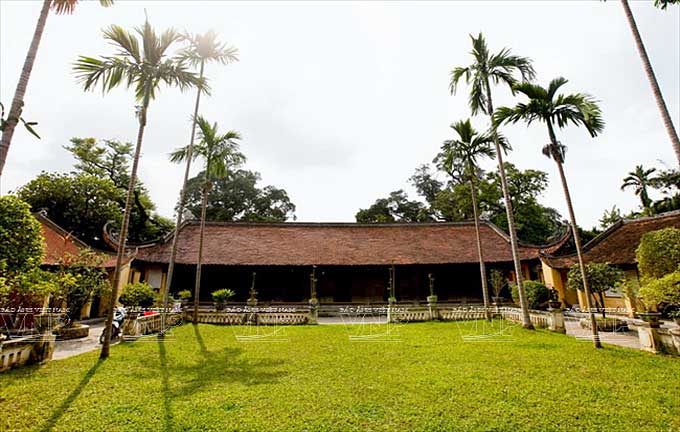Dong Ngac village is located about 10km from downtown Ha Noi, is one of few villages which have still kept intact the cultural features and old historical architecture despite the impacts of rapid urbanization.

Dong Ngac Village in North Tu Liem District (formerly known as Ke Ve) is famous for its communal house, manyold houses and ancestral worshipping houses hundreds of years old.
Stepping through the village’s mossy gate and walking on a brick-paved road, visitors will walk into a completely different space, which is quiet, peaceful and quaint. The first and must-see destination is its large-scale communal house which was built in 1653 to worship three genies, including Thien Than or Doc Cuoc, Dia Than (the village tutelary god) and Nhan Than (a famous general).
The communal house is a solemn place where the village’s most important events take place. It now displays a set of ancient paintings from the Le Dynasty (1427 - 1788) depicting bumper harvests and the peaceful, prosperous life of people and eight paintings showing the trades of fishery, forestry, fabric weaving, husbandry, farming and handicraft and 20 doctorial steles of the villagers from the Le to the Nguyen Dynasties.
Following the paved path and the smoke from kitchens, anyone who walks on the narrow lanes around the village, called “Dong”, “Ngac”, “Ke” and “Ve”, in the village are surprised that so near the capital there is such a quiet and peaceful space.
Like many other villages in Viet Nam, Dong Ngac is moving forward with the pace of development but it has still preserved its architectural works, ancient houses 100 years old in the architectural style of the northern delta in Viet Nam or the French style, Tu Khanh Pagoda built in the 18th -19th century and dozens of ancestral worshipping houses of the Do, Pham, Phan, Nguyen and Hoang families. Among them, the ancestral house of Do Family that honors Do The Giai, a senior official under the Le-Trinh Dynasty (the 17th-18thcentury), has many valuable objects, such as bronze gongs, parallel sentences in Chinese characters, altars, two 2m-high cranes standing on tortoises and two steles.
Time has touched the ancestral house, but its cultural value remains, thereby it has been selected as the place for shooting scenes of daily life of people in the past by many film directors.